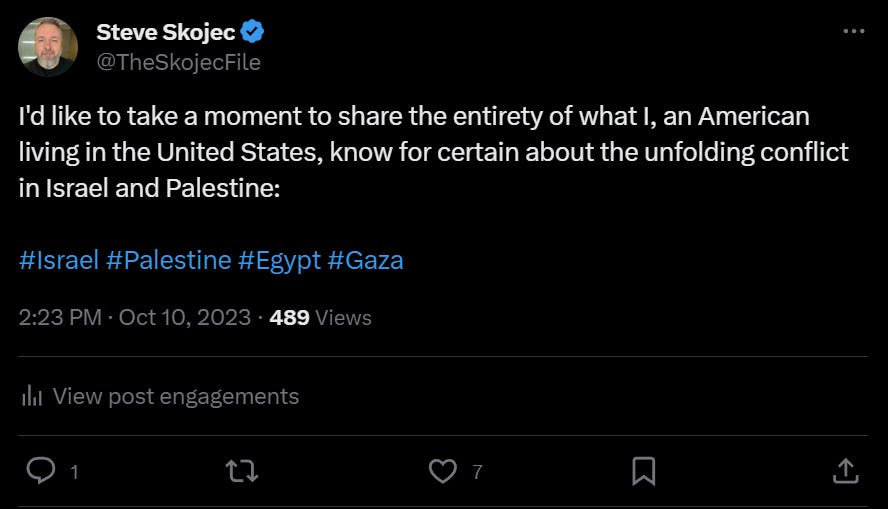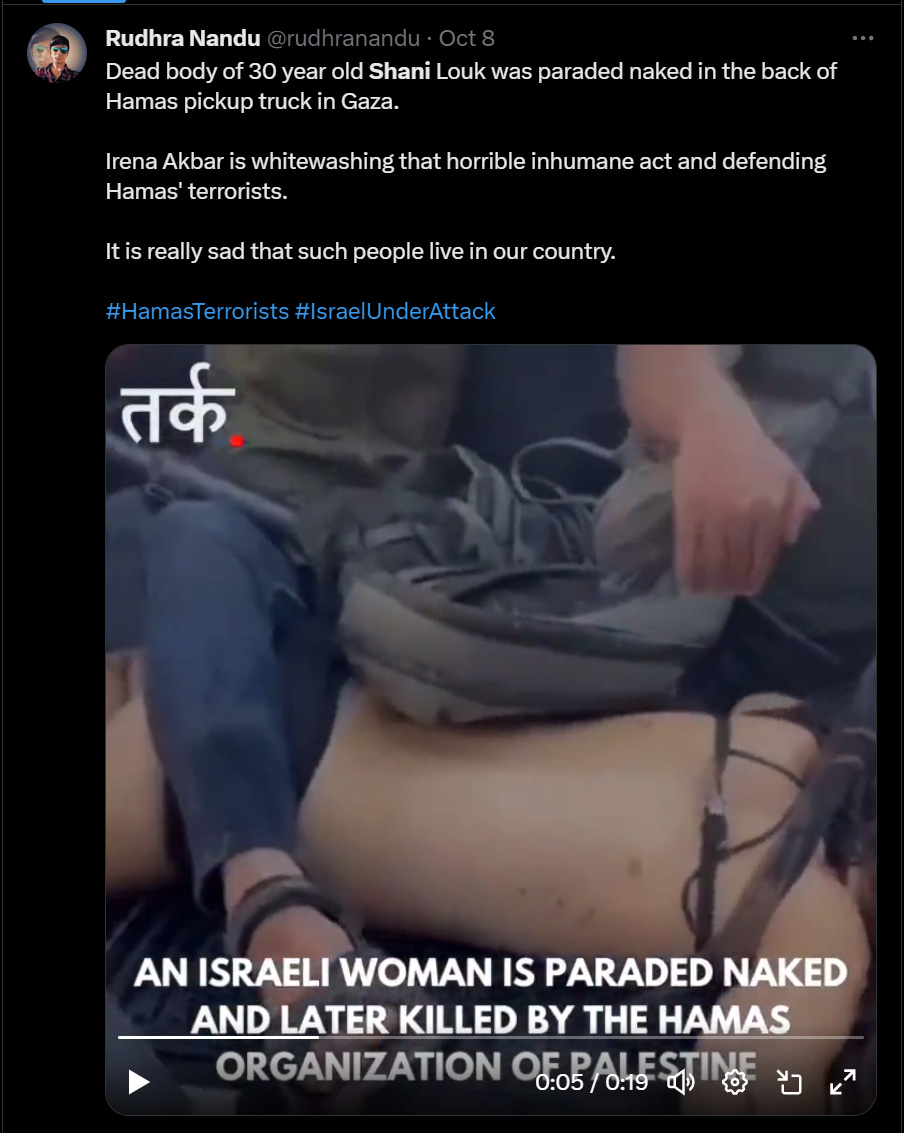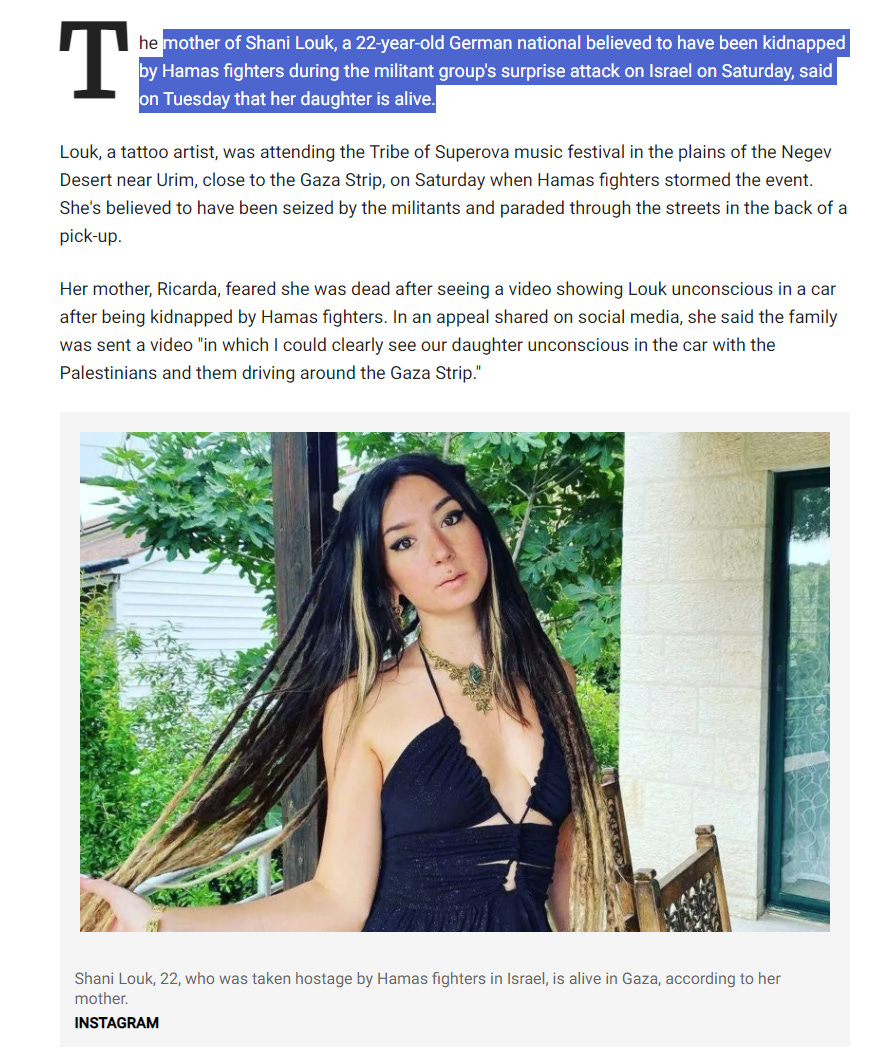Getting Caught Up In What We Don't Actually Know - Hamas Attack Edition
We know lots of things about what's going on in the Middle East right now. We just don't know how many of them are true.
Like most people who are at all online this week, I’ve been heavily distracted by the burgeoning war brought on by the Hamas terrorist attack in Israel over the weekend. The region lies at the epicenter of a religious and political web of connections that point to far-reaching implications if the conflict doesn’t die down soon.
But like most people, I also have work to do. I’ve got a business to build, a website to fix, CRMs to manage, videos to produce, printed materials to order and have shipped, and so on. I also have all my kids home for fall break, meals to prepare, doctor and dentist visits, my continuing trips to the gym to help unfat myself — the whole nine.
There’s been a bad vibe in the air that’s been growing heavier since the surprise Saturday attacks that left 250 people dead and 7 times as many wounded in Israel, with similar numbers coming in from Palestine as Israeli retaliation rolled out. This morning as I got to gym, I felt this oppressive sense of anger overtaking me. Some of this was, admittedly, my own continuing religious struggles, as I found certain objections I have to some biblical descriptions of God’s actions (1 Sam 15 to be specific) mapping a bit too closely to reports of Hamas butchering women and children and beheading babies. I started picking fights about that here and here. Maybe I shouldn’t have, but hey, as I said, the anger vibe was intoxicating today. Almost felt like an exterior force, like I breathed something in on the way to my workout.
This afternoon, doomscrolling through the latest, I found myself wanting to comment on a development, then stopping to actually think before doing so. I settled on this instead:
This is the long and short of it. I’ve watched a number of videos, read a number of reports, see photos and “BREAKING NEWS,” but I have no means of verifying almost any of it.
I’ll ask you all a question I’ve asked elsewhere: Do you feel like you're getting any info that hasn't been propagandized, decontextualized, taken from other times/events, or in general sufficiently unadulterated that you can make reasonably accurate judgments about what's happening on the ground?
I certainly don’t.
Our emotions are being manipulated, both intentionally and not. The often-wise “Luinalaska” posted this observation today, and it resonated with me:
In a series of replies to her and others, I offered some observations I’ll re-constitute here:
Kinda feel like the best thing to do right now is withdraw to normal, every day life. It's tough for those of us who don't have a lot of adult socialization day to day to talk about big ideas or current events, but this is crazy.
I have pretty high empathy. I can't absorb all the horror I see. I can't keep imagining myself or the people I love in these scenarios, day after day. I don't think any of us have the moral equipment or the wisdom to know how we would deal with any of this.
I feel like this pushes me in the direction of wanting over-simplistic solutions. I want to just nuke the problems so I don't have to keep thinking about the situational ethics of every goddamm video I see. What I wind up feeling is almost nothing but anger. I've been in a pissed off mood all day and I don't even have a clear understanding of why. But I think it's this. We were not made for anything approaching omniscience.
I know this will elicit a certain number of predictable, knee-jerk responses of “I think people should get off of Twitter.” Duly noted. Not gonna happen. Twitter is THE medium for discussing current events and gathering news as it happens. You have to dive into the cesspool for that cool drink of “this is what’s going on,” even if you take in a mouthful of sewage with it. But then, after a bit, get the hell out.
The larger issue is, I think, the distillation of All That Is Evil And Wrong In The World into a concentrate, that is then forcibly mainlined into our veins. The evening news only lasted 30 minutes. This is 24/7/365, and it’s way, way more graphic.
But that doesn’t mean it’s not misleading.
Over and over this past few days, I’d seen videos of a young woman from Germany named Shani Louk who was in Israel for a music festival, when she was captured by Hamas forces, had who-knows-what done to her, and whose body was thrown in the back of a truck. I’ll spare you a link to the video. I didn’t watch it. But here’s a screengrab of the first tweet that comes up when I search her name:
There’s the shot. Now here’s the chaser, from Newsweek:
The story continues:
While the video doesn't show the woman's face, Louk's family said they were able to identify her by her dreadlocks and tattoos. In the clip, she asked for anyone to send help or news about her daughter.
On Tuesday, Louk's family announced they had proof that Louk—who grew up in Israel—was alive. Swiss German-language news website Blick reported that her mother said she was in a hospital in Gaza with serious head injuries.
"We now have more information that Shani is alive," her mother told television channel NTV, adding she received the information from unnamed Palestinian sources.
The mother added that Louk is seriously injured, and asked the German government for help and quick action.
But the person whose accounting of this story showed up on my timeline had an entirely different take than what the story says:
“Rather than parading her body around,” the tweeter (who I’ll leave anonymous) states, “the Palestinians were taking her to a hospital.”
But that’s not what the story said. And that change, though subtle, portrays the terrorists in a more favorable light.
A little twist, a little turn. A slight re-adjustment of the emotional register.
The Newsweek piece he is ostensibly citing actually said the opposite, as quoted above. Let me repeat, because it’s all getting a little confusing:
She's believed to have been seized by the militants and paraded through the streets in the back of a pick-up.
[…]
[A]fter seeing a video showing Louk unconscious in a car after being kidnapped by Hamas fighters. In an appeal shared on social media, she said the family was sent a video “in which I could clearly see our daughter unconscious in the car with the Palestinians and them driving around the Gaza Strip.”
It’s a great story. A perfect story. The version I heard goes something like this: a beautiful young woman from Germany visiting Israel to dance for peace with the Jews her country once famously oppressed and butchered. But then, out of nowhere, the venue was attacked, she was tragically captured, tortured, defiled, paraded, and killed by the monsters from Hamas. Your blood should be boiling, the subtext whispers. This cannot be allowed to stand.
The thing is, if the attack happened as described, it was monstrous. They killed hundreds of innocent people. It was an invasion. A slaughterhouse.
But I wasn’t there, and I don’t know which version of events to believe. Shani was the face of the innocent dead for three days. And then, like a media Jesus, she arose from the tomb.
We are drowning in misinformation. In propaganda. In misperception. Caught up in a never-ending game of telephone.
And the stakes are incredibly high.
We don’t know how much we’re being misinformed or even manipulated, because we do not have the tools to ascertain such things from afar. I’ve seen journalists accused of flat out making up stories. I’ve seen poignant observations about how “if the Jews control the media,” it’s weird that they seem to be biased towards the Palestinian cause.
Which trope, which meme, which story, which tweet, which “facts” can we truly believe?
Our perceptions, real or not, stoke our passions, spoil our moods, disrupt our work, distract our thoughts, and orient us this way and that. They may change the policies and politicians we support and the way we vote.
These actions may, in fact, have deadly consequences down the line.
I made the mistake last year of writing a puff piece about Volodymyr Zelenskyy early in the Russia/Ukraine conflict. It was made based on gut feelings and media consumption. I liked the story I was being told, and I went with it.
I don’t know how much of what I wrote actually matches up with any of the facts, and I don’t have the time or the means to reconcile the books on the issue. I shouldn’t have written it. I shouldn’t have posted it. I didn’t know enough, and I feel like an idiot.
I will endeavor not to make the same mistake again.
I am notoriously allergic to conspiracy theories, because I see too many wild ones get too out of hand. Our standards of evidence are piss poor, collectively. The more we distrust our institutions and our experts, the more bizarre our theories get.
But the fact is, we’re being manipulated — all day, every day. Be vigilant about what you believe. You never know when you’re going to regret being played for a fool — or worse — refusing to accept that it happened to you, and doubling down on the error.








Years ago, probably over a decade ago, I followed the writings of Nicole Foss at the website Automatic Earth. One her posts struck me deeply at the time. It has come to mind over and over in the passing years. In the post she described a concept called the “trust horizon”. Her thesis was that the post World War II west had created an unusual social construct where people were able to trust larger and larger, more and more removed institutions. The social, political and economic order had created a situation, not found often in history, where people could rely on supply chains and systems from the other side of the world to provide basic needs for food, raw materials, manufactured goods, military security and a number of other of the benefits of civilization.
The advent of the internet reinforced this for a time. Platforms like Ebay created a world where an individual in Biloxi, could personally order something from a person in rural China with confidence that goods and money would successfully change hands. Foss claimed that this only worked because people placed their individual trust in institutions that had global reach and power.
She correctly predicted that western society was beginning to unravel. Part of this unravelling would be a progressively shrinking trust horizon.
We are now at the point where the “trust horizon” is completely collapsing. We are swimming in an ocean of lies, half-truths, misinformation, spin and confusion. It is increasingly difficult to trust the media, government, corporations, financial institutions, organized medicine, religious organizations and even supposed charitable and educational institutions.
Watching the events of last weekend from my cabin in the north woods of New England (yes, the internet reaches even there) filled me with both horror and dread. What was being beamed around the world were live re-enactments of the Viking raids of the dark ages, or of the ravages of Genghis Khan and Atila the Hun across the steps of Asia and Eastern Europe.
As the week has progressed the narratives from both sides (all sides?) have begun to solidify. My sense is that the “news” is being highly edited to produce specific emotional responses. My inner alarm bells are becoming louder. I have a growing sense that, even if there was no initial conspiracy to create certain outcomes, multiple parties have now seized the opportunity to push their particular perspective on events in order to optimize their positions. In this rush to gain the emotional high ground the truth is increasingly trampled and buried.
I have no answer to this. Events seem to be overtaking even the most powerful and entrenched institutions’ ability to respond and deal with them. I can only control what is in my immediate present. My own life, thoughts, family and work. The larger world is becoming more obviously dangerous but there seems to be little I can do other than to watch and try to be aware.
As a Christian, I do believe that there is a supernatural aspect to all of this. But even there, it seems that, beyond trying to live out my beliefs in my own life, there is little I can do. I try to focus my trust on the belief that God is in control and that there is a plan, even when I cannot see it.
Carry on Steve. Your post was right on about the craziness and uncertainty of our present situation.
JT